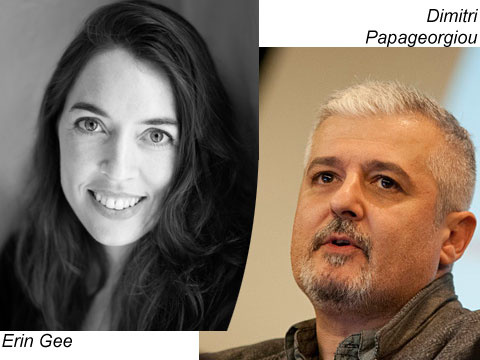
CONCERT IX
The Center for New Music Ensemble
featuring guest composers
Dimitri Papageorgiou, Aristotle University, Greece
Erin Gee, University of Illinois, Urbana-Champaign
John Berners, University of Indianapolis
Sunday, December 4, 2016, 7:30pm at the Concert Hall
|| download program ||
Program
I. Overture
II. Tragic
III. Antique Aria
IV. Finale: Agitato
Dave Gier, trombone
Volkan Orhon, double bass
Christine Burke, bass clarinet
Jeiran Hasan, alto flute
Elizabeth Fleissner, oboe
Thiago Ancelmo De Souza, clarinet
Alex Widstrand, bassoon
Ethan Brozka, horn
John Kenneth Gorder, trumpet
Robert Parker, trombone
Program Notes
John Berners
Divertimento for oboe, trombone and double bass Divertimento for oboe, trombone and double bass adds to what is surely a very small repertoire for this combination of instruments. But with one high, one middle and one low voice, this ensemble actually has possibilities. Each of the three has great expressive abilities as a solo instrument, and to my ear, all share a very appealing extroverted expression, as opposed to the more reserved refinement of, say, a flute, viola, or harp. The Overture places the trio in the theater. You can imagine acrobats or puppets taking the stage to the sound of this lively, economical pit band. The next two movements are darker. The middle of the “Antique Aria” has a trombone solo in which the player imitates the sound of a natural horn, dating before the invention of valves. By locking the slide, placing one hand in the trombone bell, and playing notes only available in the harmonic series, the trombonist produces a veiled, “antique” sound. Played this way, several notes fall outside our equal-tempered scale. The valveless horn and trumpet players of earlier centuries had to compensate for the pitch of these notes as best they could, and their use here suggests a voice from long ago. The Finale brings back a quick tempo, with rhythmic propulsion and virtuosity from all three players.
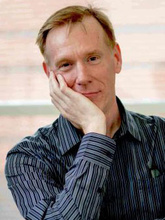
Erin Gee
Mouthpiece: Segment of the 4th Letter and XIX
My paintings have neither objects nor space nor time nor anything—no forms. They are light, lightness, and merging, about formlessness, breaking down form. —Agnes Martin
When we study the science of breath, the first thing / we notice is that breath is audible. —Hazrat Inayat Kahn
In the Mouthpieces, the voice is used as an instrument of sound production rather than as a vehicle of identity. Linguistic meaning is not the voice’s goal.
The construction of the vocal text is often based on linguistic structure—vowel-consonant formation and the principle of the allophone—and is relatively quiet, with a high percentage of breath.
The Mouthpieces began as solo vocal works, devoid of semantic text or language and notated with the International Phonetic Alphabet. In the Mouthpiece series, the voice is used as an instrument of sound production rather than as a vehicle of identity. Linguistic meaning is not the voice’s goal.
In Mouthpiece: Segment of the 4th Letter the voice is absent. The ensemble takes on the articulatory possibilities of the mouth, and the percussive, pitched and noisy elements are mapped on the instruments, as they mirror the properties of the vocal sounds.
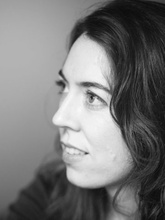
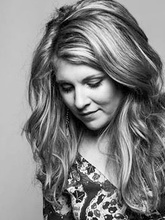
Born and raised in Omaha, NE, Ms. DeBoer moved to Chicago to study at DePaul University where she received a Bachelor of Music. She received a Masters degree from the University at Buffalo, where she studied with acclaimed contemporary interpreter Tony Arnold, and a Doctorate of Musical Arts from Bowling Green State University.
Dimitri PAPAGEORGIOU
In pulses, in strokes
Existence comes in pulses, in strokes. I see no reason for not stopping, or for stropping, anywhere in that flux. Existence has as many centres as it happens to have, as many moments, feelings, assumptions, questions—all in the air and with no power over one another. But if we have time and patience to study a natural world posited as the source and common continuum in all this existence, we assume that it has dynamic unity: otherwise from one point in it we could never justly infer or posit any other point in it. This is my argument for materialism. —GS, The Letters of George Santayana: 1941-1947
Iriai no kane
The title of the work refers to the large bronze bell of the buddhist temples that often becomes the subject of several haiku poems. The word iriai literally means “sunset,” but according to Shihji Ogawa, it is shorthand for “the sunset bell.” In the haiku tradition, there is often a close association between the sound of the tolling bell that announces the end of the day, the mutability of human experience, the sheer temporality of all things and a feeling of infinite sadness, as in the following haiku by Shinkei that sparked the idea of the current work:
| odorokade kyo mo munashiku kurenu nari aware ukimi no iriai no sora susumuru kane o aware to mo kike —Shinkei |
Unmoved as ever, yet another day has drawn to a useless close; the pathos of drifting souls as the evening bell fads in the sky. Hear the infinite sadness in the lesson of the booming bell |
Iriai no kane attempts to capture a metaphor of the sound of the evening bell that reverberates like an echo in the mountains in the background of a temple and seems to envelop the whole area.
The work was commissioned by conductor Edo Micic and his ensemble Zeitfluss.
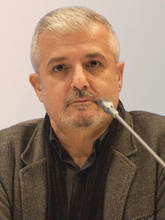
His works have been aired several times by the ÖRF (Austria), the Greek National Radio (3rd Program and 95.8), and several U.S. Radio Stations. He has appeared in festivals and conferences in Austria, Germany, Switzerland, France, Spain, Russia, Greece, Cyprus, Croatia, Turkey and several States of the U.S.A. (NY, CA, FL, MI, IL, IA, OH, GA).
He has received commissions by several institutions and ensembles, such as SCI/ASCAP (U.S.A.), Institute for Electronic Music and Acoustics of the University of Music and Drama at Graz, Austrian National Radio and Literature Forum Graz, Thessaloniki Concert Hall, Ensemble Interface (Germany), Zeitfluss Ensemble (Austria), UMS & JIP (Switzerland), Trio IAMA (Greece), Ensemble Etcetera (USA), etc.
In 2008 he was composer-in-residence at the festival 4020.mehr als Musik Linz and in 2006 the Minoritensaal Graz programed Papageorgiou's composer's portrait. In summer 2012, his work "Effluences" has been heard at the 46th International Summer Course for New Music Darmstadt and in March 2013 Klangforum Vienna performed his work In the Vestige of the Present at the Vienna Konzerthaus.
He appeared in the discography in 2005 with the CD "Musing" by Capstone Records, NY, featuring his work "...d'ogne luce muto". In 2009 his work "In the Vestige of the Present" appeared on the CD "Present Perfect, Vol. 1" by Trio IAMA, which was released by Dissonarnce Records.
He is the co-founder of the dissonart ensemble the first non-state sponsorded new music ensemble in Greece.
David Lang
Scraping Song was written by composer David Lang for fellow University of Iowa alumnus and percussion virtuoso Steve Schick. It is a companion piece to another of his works, The Anvil Chorus, also written for Schick. The piece was inspired by two interactions that Lang had with Schick. The first of which was at the University of Iowa when Lang witnessed Schick auditioning guiros for a performance of Stockhausen’s Zyklus. Lang states that Schick played each guiro “as if it were a violin, drawing from each an expressive range I never realized a percussion instrument could have.”
The second interaction from which this piece was inspired was more recent from a recording session of Bang on a Can’s arrangement of Brian Eno’s Music for Airports. In this recording session, Lang asked Schick to scrape around the outside of a brake drum slowly. Lang describes the resulting sound as so rich that he knew he had to write a solo about it. Scraping Song is written for four resonant metals, four bell-like metals, four guiros or other scraped instruments, and one rock bass drum. The three groups of four instruments are used together to create a complex rhythmic structure that is typical of Lang’s compositional style.
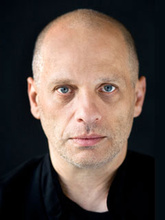
Recent works include the concerto man made for the ensemble Sō Percussion and a consortium of orchestras, including the BBC Symphony and the Los Angeles Philharmonic; mountain for the Cincinnati Symphony; and death speaks, for Shara Worden, Bryce Dessner, Nico Muhly, and Owen Pallett, at Carnegie Hall. Upcoming highlights include the world premiere of his opera anatomy theatre written in collaboration with visual artist Mark Dion at Los Angeles Opera in June 2016; the North American release in December of Academy Award-winning director Paolo Sorrentino's film Youth , for which Lang composed the score; and Cantaloupe Music's release of the world premiere recordings by the Los Angeles Master Chorale of Lang's the national anthems and the choral version of the little match girl passion .
Lang is Professor of Music Composition at the Yale School of Music and is also co-founder and co-artistic director of New York's legendary music festival Bang on a Can.